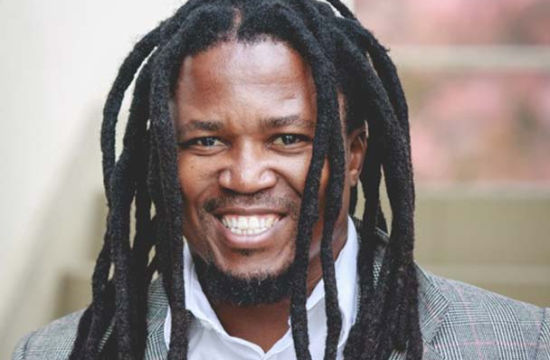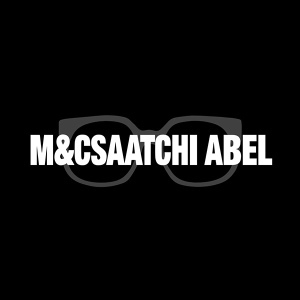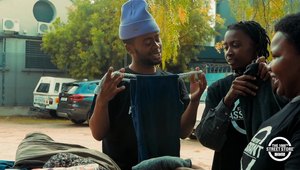
5 Minutes with… Neo Mashigo

Neo Mashigo is not the sort of person to sit still, doing the same thing day in and day out. As a kid, he dreamed of being a lawyer and took part in the school debate team – while also writing plays and learning about art and drama. It makes life at an agency like M&C Saatchi Abel a good place for him to be – one day he’ll be tackling the tech bias that means computers and apps often read African names as little more than mistakes, the next he’ll be working on a 27-storey tall glass tower tribute to his country’s inspirational and unifying Mandiba.
But Neo’s creative dreams and ambitions also tumble out beyond the walls of the agency too. He’s a co-founder of creative collective and production company I See a Different You, which was set up as a platform to celebrate the creative voices and talent of South Africa and to share a different and contemporary perspective on life in townships. With the money generated by the enterprise, he and the team are looking to set up a creative Saturday school to give young black children access to the arts and the opportunity to build creative thinking skills.
LBB’s Laura Swinton caught up with Neo to find out more about his fascinating journey – and where he’s going next.
LBB> Let’s start at the beginning – how did you find your way into advertising?
Neo> I’m one of those people who wanted to do lots of things. In high school I was clear that I was going to be a lawyer but my favourite things were writing and drama. Also, I was a bit entrepreneurial, so I was always selling stuff.
When I went to university, I signed up to study law. The main reason I didn’t do art was that everyone was saying that I would be poor if I did that. I was not about that life! Then I went to work at a research company that researched adverts, mainly ads that were targeted towards the black consumer. And every time I sat in those meetings I would think, ‘oh God, they’ve got it so wrong… this is what I would have done’. And in the research, I’d be proven right. Then I started having conversations with the client and agency people.
At the same time, my friend at home was studying to be an art director. I started working with him on his projects. A year later, the Creative Directors Forum put an ad in the newspaper, challenging people who thought they had what it takes to succeed in advertising. After several rounds, I was one of the people selected. We were placed in agencies for an accelerated programme. During the day we worked and in the evening we went to advertising school.
The agency I went to Net#work BBDO, which was the number two agency at the time. The number one agency was TBWA\Hunt\Lascaris. Everyone wanted to go to Hunt Lascaris, but I said, I wanted to go to the number two agency. They were the challenger; I wanted to feel like I was part of the team taking us to number one. It was very interesting getting there; I was the only black creative in the agency. And the agency, all the creatives were award-winning creatives. Every second week there was a celebration for some achievement, so that’s where the appetite for achieving started. I was never obsessed with awards because at the time a lot of the work that was being awarded most of the time I deemed to be broken and not that relevant to South Africa. The stuff I wanted to do, nobody really understood.
LBB> And when it comes to awards, particularly international awards, do juries understand the work that’s really relevant to South African culture?
Neo> It’s a world that we all see and understand is Hollywood-based. It’s Hollywood culture and hip hop culture. If [an award-winning piece of work that’s] African or Indian it has to be some sad story about kids without food, it’s never just an ad. It’s always malaria or rhino horns, that’s the only time that African work wins awards! You know, it has to make the white male judge feel sad and guilty and then it will win something.
I decided that I would focus on creating work that people talk about. As time went on, that work started to win awards locally and, now and again, internationally.
LBB> It’s interesting that you came from a research background because a lot of creatives have a… shall we say ‘difficult’ relationship with research…
Neo> I also have a very difficult relationship with research! We use research to make decisions – we don’t use the research to inform us about the person that we’re talking to. For the people sitting in a research group, anything that is new becomes foreign and it subconsciously rings alarm bells that say ‘this is strange, it’s not how it’s supposed to be’. Good marketers know that with anything new, you need to have an instinct around it and you have to trust the logic of why you are going this way and understand that this one will bomb in research. I still have that relationship, don’t like it much. Well, I like research that comes to me before we do the work.
LBB> Do you find your legal training helps you in any way in the job you do today?
Neo> I think so. In high school I was in the debating team. I use that! I think it has helped in terms of how to lay a good foundation to sell an argument that is different to what people are accustomed to.
If you lay the foundation properly, you’ve done your homework. I think creatives like to go in and razzle and dazzle! We make the mistake of thinking that everyone is like us. People are not like us. In society, you’ll probably find that 10% of society will accept change and new things and the rest will not.
LBB> And where do marketers sit in that divide?
Neo> In South Africa, when I started, marketing departments had lots of power and most of them had started with the business from day one. In the C-suite, they were part of the decision-making unit, whereas now they are the hired hand.
They don’t want to make errors or mistakes. A lot of them work on global brands and their career paths are based on not making waves. They’ll send you to India for three years or Africa for four years and then Brazil for four years and you move up the ranks that way. You go back to Europe and because you didn’t disturb anything, so it’s fine. Our markets? They don’t care much for them. Nobody’s demanding too much of you. That person is not signed to change a lot - in fact they’re probably brought in to stabilise the business and they will do safe stuff.
LBB> I’d love to talk to you about I See a Different You, your side project. How would you describe it and how did it come about?
Neo> In the early days, I wanted to do something that would allow creatives to work on other things aside from making ads. Everyone wants to write a book or make a movie, or have an exhibition.
I started I See a Different You as one of the projects. We started with a simple idea: we wanted to change how Africa is seen by the world, how we are perceived. And if we do this as an independent thing we will probably influence and help advertising come to par with where we’re at. Fortunately we started at the right time with social media, where you can see people’s reactions and you have something to show clients. It trended. The first project was about Soweto and how Soweto is perceived, that it’s about more than the Soweto uprising and all of that. It’s not about hungry kids and stuff – we had fun in Soweto and we wanted to show that side of it. In every situation there is yin and yang, you can’t just focus on one side.
After that it was picked up quite quickly abroad more than in South Africa first. In South Africa it was picked up by the people who were already in line. In South Africa, even with the new dispensation and the unity and the rainbow nation and all of that, mentally it’s still divided. There are still a lot of things that white people don’t know about black people and there are still a lot of things that separate black and white people culturally. If you legally separate people for years and then suddenly the rules are broken, behaviour will remain the same.
LBB> So I’ve long been aware of this divide in the context of the South African market, but can you give us some context on it?
Neo> So the big deal was that you would go to a set in South Africa and everyone making the ad was white: the agency creative, the client, the crew, the director – but the cast was all black and the ad was targeted to black people. That’s a big thing that defines what the work will look like and in that situation you’re going to miss a lot of things, and none of the cast members will correct you. Even if they try they’re probably going to get bitch-slapped and if they’re just and extra they’ll be shown the door.
Within the agency world, it’s still like that. Before, the budgets went towards targeting the white market, but the white market has been saturated for a while now. So now the clients want to target the black market but the agencies’ transformation is not on par. It’s not through lack of trying, but because it was a closed-off industry. Even now, there will be a few black people coming into the agencies but they’re very junior. So five or six years down the line, it will be better. In the entire country, there are only about four black ECDs.
LBB> And how much of that comes down to creative education and opportunities for black children in South Africa?
Neo> Yes there’s still that because the creative industries are not part of the school curriculum, unless it’s at a private school. There isn’t really critical thinking or creative thinking – education is still very traditional and only really covers the basic subjects.
One of the projects that we are going into at I See a Different You is exactly that - opening a creative Saturday school. When I was young I went to a Saturday school, where I did art, karate, creative writing. It’s where I was able to learn how to write a play.
Saturday schools are gone now, and if they do exist they only cater for maths and English to help you improve your school grades. But there are lots of kids who want to do film, photography, art, anything creative. It’s about teaching people how to think creatively. That’s our project for next year.
What’s happening at the moment with I See A Different You is that we are a production company, we do some film and photography, we work with clients, we do a bit of influencer work (but only if we do the production). As a business we can still sustain ourselves. The core idea was that we should be able to fund the things that we want to do.
LBB> And how does the work you do with I See a Different You feed into the work you do with M&C Saatchi?
Neo> I’m the only one in I See a Different You that works full time at an agency. What we realised was that if we are all outside of advertising, we also tend to be out of the conversation. And that conversation has a couple of layers: what is coming up in the industry? What are the new trends? What are the clients’ needs? If the agency had said, “no you can’t be in I See a Different You while working at M&C Saatchi”, I would go full time to I See a Different You and wing it that way. But fortunately the agency understands so it allows us to be in the know on both ends.
Internally, the benefit for the agency is that it gets to impact where we should be going. Currently the conversation we’re having at the agency is how do we involve more non-traditional creatives in our agency and how do we allow the creatives that we have to function in a way that is most optimal for them? How do we create an environment that allows people to thrive?
In the past, the Cape Town and Joburg offices had their own bottom line, so if you had to borrow a creative from one office, you’d have to pay for their time and it creates all sorts of issues. Now we have said that the creative department is one for the whole country and we can assign the best creatives for a particular brief. It’s not about who is available, but who is right.
Also if there’s a creative that’s in a band and they get to go tour the UK for the month, we don’t frown on that. It’s a good thing for us because they come back recharged, energised, relaxed.
We’re breaking down all of those traditional walls, that employer-employee mentality that says, we own you, you work for us. These people could be freelance and do whatever they want, but they choose to work for us. Let’s give them the freedom to be who they want to be, and logic says that way you will have the best partner for your agency.
LBB> That entrepreneurial thread seems to be something I’ve seen woven through several M&C Saatchi offices around the world, though it expresses itself in different ways…
Neo> That was key for me with M&C Saatchi because of their business and how it views the agencies. It isn’t structured like a PLC sitting at the top directing everyone in what to do. Everybody works in their own way – and then we all learn from each other. You don’t ask for permission to do anything. If it works, then great. If it doesn’t, well, we can tell the rest of the group, shit, you might want to think about this, this is what went down. We are not afraid of trying out stuff. Right now we are going through a lot of change and it’s applying some of the things we had done on smaller scales. Now we are going full throttle.
LBB> In terms of recent work that you’ve been involved in, what should we check out?
Neo> We’ve been doing a lot of interesting stuff on Nando’s. In South Africa it is the voice of the people. So whatever we do is about thinking, ok what are people thinking, and how do we take this to the media space?
The last thing we did for them was Right My Name. With names like mine, computers often won’t recognise them. It sees it as a spelling error. My name is not a mistake! And it does that to most names in South Africa. For us, it also hits harder because of societal matters around black people and how we view ourselves. Even Nando’s gets a red line beneath it. We created an app that allowed your computer to recognise your name.
The other one was about the fact that there was a lot of Afrofusion and Afrofuturism in how Africa has been portrayed in the media and in advertising. And this was even before Black Panther! In an ad you’ll talk about ‘our’ culture, but when you see the person in the ad, you can’t identify what culture this person is from. So anyway, it takes away from your actual culture and creates a combination of various things that becomes meaningless. So Nando’s took a point of view and said, is this how we want to talk to people now? So we created ads that said we are real people and this is how we are.
LBB> And you’ve got some really exciting news too about a special Nelson Mandela project, I hear…
Neo> We recently won a bid on a Nelson Mandela memorial project – this year is the centenary of Mandiba’s birth.. They wanted to make a memorial statue. We went back to them with a proposal. Instead of doing a statue, which is just this big thing that looks at you and that’s it, we went and created a building. We call it the Tower of Light. It represents not only Mandela but also the people around him and the journey he went on.
At the moment we’re doing the business case study. The precinct is supposed to be full of tourism and business and community projects. Then it’s funding and then production. If we start production in two years that’s the longest I think we can give it.
As an agency we decided that we would go into spaces that were not just traditional agency spaces. We decided that we would engage in ideas and culture and creativity, so we’re not boxing ourselves into traditional spaces. We want to partner with anyone else who is doing stuff that we would like to do. We’re very excited about this.













